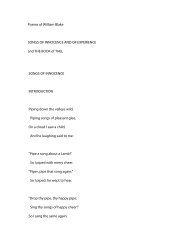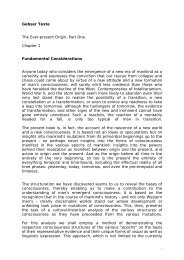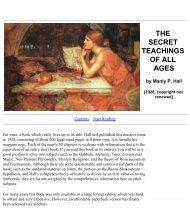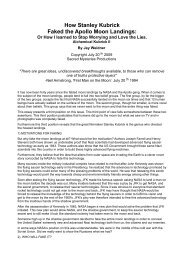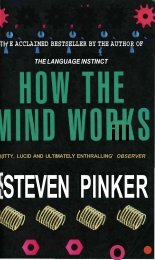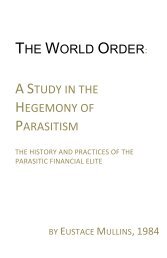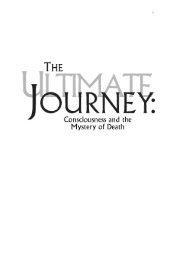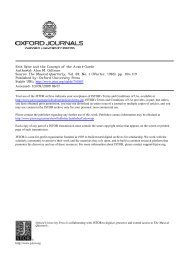The Mass Psychology of Misery - michaeljgoodnight.com
The Mass Psychology of Misery - michaeljgoodnight.com
The Mass Psychology of Misery - michaeljgoodnight.com
Create successful ePaper yourself
Turn your PDF publications into a flip-book with our unique Google optimized e-Paper software.
meaning to our lives and consciousness. Consider Samuel Klarreich's StressSolution (1988): "...1 believe that we can largely determine what will be stressful. andhow much it will interfere with our lives, by the views we uphold irrespective <strong>of</strong> whatgoes on in the workplace." Under the sign <strong>of</strong> productivity, the citizen is now trained asa lifelong inmate <strong>of</strong> an industrial world, a condition, as Ivan Illich noted, not unrelatedto the fact that everyone tends toward the condition <strong>of</strong> therapy's patient, or at leasttends to accept its world-view.In the Psychological Society, social conflicts <strong>of</strong> all kinds are automatically shifted tothe level <strong>of</strong> psychic problems, in order that they can be charged to individuals asprivate matters. Schooling produces near-universal resistance, which is classified, forexample, as "hyperkinesis" and dealt with by drugs and/or psychiatric ideology.Rather than recognize the child's protest, his or her life is invaded still further, toensure that no one eludes the therapeutic net.It is clear that a retreat from the social, based largely on the experience <strong>of</strong> defeat andconsequent resignation, promotes the personal as the only possible terrain <strong>of</strong>authenticity. A desperate denizen <strong>of</strong> the "singles world" is quoted by Louise Banikow:"My ambition is wholly personal now. All I want to do is fall in love." But the demandfor fulfilment, however circumscribed by psychology, is that <strong>of</strong> a ravening hunger anda level <strong>of</strong> suffering that threaten to burst the bonds <strong>of</strong> the prescribed inner world. Asnoted above, indifference to authority, distrust <strong>of</strong> institutions, and a spreading nihilismmean that the therapeutic can neither satisfy the individual nor ultimately safeguardthe social order. Toynbee noted that a decadent culture furthers the rise <strong>of</strong> a newchurch that extends hope to the proletariat while servicing only the needs <strong>of</strong> theruling class. Perhaps sooner than later People will begin to realize that psychology isthis Church, Which may be the reason why so many voices <strong>of</strong> therapy now Counseltheir flocks against "unrealistic expectations" <strong>of</strong> what life could be.For over half a century the regulative, hierarchical needs <strong>of</strong> a bureaucraticconsumeristsystem have sought modern means <strong>of</strong> control and prediction. <strong>The</strong> sameconsolatory ideology <strong>of</strong> the psychological outlook, in which the self is the overarchingform <strong>of</strong> reality, has served these control needs and owes most <strong>of</strong> itsassumptions to Sigmund Freud.For Freud and his Wagnerian theory <strong>of</strong> warring instincts and the arbitrary division <strong>of</strong>the self into id, ego and superego, the passions <strong>of</strong> the individual were primordial anddangerous. <strong>The</strong> work <strong>of</strong> civilization was to check and harness them. <strong>The</strong> wholeedifice <strong>of</strong> psychoanalysis, Freud said, is based upon the theory <strong>of</strong> necessaryrepression; domination is obviously assisted by this view. That human culture isestablished only by means <strong>of</strong> suffering, that constant renunciation <strong>of</strong> desire isinevitable for continuance <strong>of</strong> civilization, that work is sustained by the energy <strong>of</strong>stifled love-all this is required by the "natural aggressiveness" <strong>of</strong> "human nature," thelatter an eternal and universal fact, <strong>of</strong> course.Understanding fully the deforming force <strong>of</strong> all this repression, Freud considered itlikely that neurosis has <strong>com</strong>e to characterize all <strong>of</strong> humanity. Despite his growing fear<strong>of</strong> fascism after World War 1, he nonetheless contributed to its growth by justifyingthe renunciation <strong>of</strong> happiness. Reich referred to Freud and Hitler with somebitterness, observing that "a few years later, a pathological genius – making the best



